When she made her initial impact on screen in 1936, Frances Farmer clearly belonged to a special category. It was not just her flawless looks, the nearly unreal sculpture of her brow, but the surprise of her low, wry voice, and this contrast was unsettling. Her idiosyncrasy had some people thinking of Katharine Hepburn, Margaret Sullavan, Jean Arthur, even Garbo. But there was a far darker side to Farmer that can be seen by close viewing of the way the expressions on her face could fluctuate, particularly in the play of thought behind her eyes. The real contrast, alas, turned out to be between the perfection of her blonde beauty, which has an aesthetic sort of calm in still photographs, with the turbulence of her sensitivity and intelligence, which was not made for the pressures and compromises of Hollywood, and the need to fight and pick your battles.
Setbacks, when they came, at first left Farmer shut-down and quiet, and she took up drinking heavily. Was there actually something wrong with her mental health by 1940 or so? Most likely, but it is hard to diagnose now, for Farmer’s life long ago gave rise to so many extreme claims of mistreatment of all kinds, first in a posthumous autobiography ghostwritten and sensationalized for money by her friend and live-in companion Jean Ratcliffe in Will There Really Be a Morning? (1972) and then in the even more sensational and agenda-pushing Shadowland (1979) by the journalist and film critic William Arnold, that some things about what she might have lived through are lost to time and in-the-dark speculation.
The writer and musician Jeffrey Kauffman spends a lot of time online attempting to correct the errors and fictionalizations of the Ratcliffe memoir, the Arnold book, and the movie Frances (1982), a descent into hell that contains Jessica Lange’s showiest, most deeply immersive, and most spectacularly committed performance, a portrait of a woman and artist who is systematically destroyed but goes down howling and fighting to the bitterest of ends. Many people became obsessed with Farmer due to this Lange movie and these two books. As a teenager, I was one of these Farmer obsessives, endlessly agonizing over long afternoons about what might have happened to her and why it happened and if it could have been avoided. Like so many others, I still remain curious about her life, and the best of what she managed to do as an actress, and I have remained haunted by her memory. Just when I think I have escaped her and put her to rest in my mind, she comes back to haunt me again.
“The most dominant thing in my nature is that I must be who I am, regardless of the circumstances, the penalties or the people involved,” Farmer told Lois Kibbee, who was going to write her memoir with her. She knew this had led her to disaster, but “I have an idea that it was also responsible for my emergence as an actress.” The tapes that Farmer made for Kibbee seem to have gone missing, but some quotes from them can be found in Patrick Agan’s book The Decline and Fall of the Love Goddesses (1979), a key source for anyone interested in some facts from Farmer’s perspective. Though Kibbee grew to like Farmer, she also had this to say to Agan. “(Frances Farmer) was really an ugly-natured woman. She was a very, very mean lady. She was mean as, as the Irish say, snake shit. She was just totally mean.”
That’s not the Farmer that Lange plays in Frances, a sly innocent gradually overwhelmed by circumstance and her own stubbornness when confronted by rotten authority figures. But Kibbee only knew Farmer later in life, and Farmer’s life experience, particularly her struggle with her mother Lillian and her stays at overcrowded and primitive mental hospitals, might have made anyone mean or ugly-natured.
Farmer was born in 1913 in Seattle to the tempestuous and publicity-seeking Lillian Farmer, a woman who had a flair for the dramatic (she once entered the office of her estranged husband Ernest, who was late with child support payments, took out a gun, and fired a round of blanks directly at him). “Make up your own mind” was Lillian’s motto with her children, who were taught independence of thought but given little demonstrative affection. Lillian wanted to get on with her own work, mainly in the dietary realm, and her four children struggled to claim her attention. Farmer remembered always wanting to win love and approval from Lillian, and this was partly why she went to Hollywood, because she wanted to get her parents out of the financial woes that always plagued them.
Farmer wrote an essay in high school called “God Dies,” which is fairly dark in outlook about the nothingness of the universe as she perceives it, and through her mentor and friend Sophie Rosenstein she won a contest that brought her a trip to Moscow that would land her in New York, where she wanted to pursue an acting career on stage. Lillian was extremely vocal in her opposition to this and went to the papers with her outrage, which was her wont, and Farmer later wondered if she ever should have entered this contest.
On the boat over, Farmer met an older Englishman named John McKenzie, who had a profound effect on her but who is still little discussed in all the dissections of her life. She fell in love with him very intensely, in the way of first love, and met with him in various cities, but then he put her to a cruel test; he had a friend approach her and wine and dine her, and this friend got her into bed, and Farmer felt very bad and guilty about this afterward. When she met with McKenzie, he coldly broke things off with her and told her why, and this surely added to the self-loathing created by her neglectful parents. “In retrospect, John McKenzie was the most significant love relationship of my life…but I found out that even if he desires it, nobody dies of a broken heart—except in opera,” Farmer told Lois Kibbee.
When she hit New York, Farmer did a screen test (she played a scene from The Lake, which had been a theater flop for Katharine Hepburn) and got a Paramount contract. In the film-stopping close-ups Farmer has in her Paramount debut Too Many Parents (1936), there is a “too muchness” to her sometimes as she gives out all her strangeness and character and emotion while trapped in the glamour machinery of the shots of this little programmer. In Rhythm on the Range (1936), a Bing Crosby musical, there is an insolence about her face at times, a dissatisfaction, that both draws viewers in and pushes them away. She is on the verge here, but on the verge of what begins to seem like a question for us, and for her; her first close-up in a wedding gown radiates a “fuck you” quality that is very much at odds with what the dress and lighting and the glossy look of the film itself is trying to tell us. Farmer goes between signaling “I’m above this” by smiling her way through some scenes condescendingly to flashes of emotion and temper that feel very real and sometimes beyond her control in a way that is both exciting and unsettling.
Yet her best performance in Come and Get It (1936), for which she was loaned out to producer Samuel Goldwyn and which was directed mainly by Howard Hawks, has a nearly static quality about it, as if Farmer has been able to put the cloak of “characterization” around herself as the saloon singer Lotta, who seems to be a memory already to the lead male character (Edward Arnold). Farmer’s Lotta has a sneering and very crooked smile and a very low voice as she sings “Aura Lee” in a saloon while smoke drifts around her, and Arnold’s character knows that he will always love her, obsessively, and we can see and hear why. In her one first-rate film, Farmer’s character inspires obsessive feelings just as she still inspires them long after her death as the most lurid and morbid tabloid story of illness and persecution of some kind. Hawks said that Farmer “had more talent than anyone I ever worked with,” and this was a man who worked with some very talented performers.
She has a very masculine aspect as Lotta in Come and Get It, maybe partly because that’s the way Hawks liked his feminine ideals; her first “Hullo” to Edward Arnold is challengingly husky, so unlike Lange’s wondering treble in Frances. She casually parks some gum on a bar before singing “Aura Lee,” and she even more casually plans to drug Arnold’s character and get some money out of him with her barroom boss. Is she a bad girl? Maybe, but there’s such gallantry in the way she moves, in the way she salutes a pal, in her overwhelming self-consciousness and consciousness of playing a role in life that might not entirely suit her, but, as they used to say, it seemed like a good idea at the time.
Farmer’s whole attitude in Come and Get It goes against so much of what studio bosses often demanded of their stars then, for Hawks liked rebels, but few others did in Hollywood. She got into trouble for many reasons, and not least of them is that Farmer wanted to bring some reality to her characters and had gone to a red light district to observe prostitutes and how they picked up men in her preparation for playing Lotta. She was very enthused by the Method acting espoused by the Group Theatre, and her work as Lotta is so specific that it does seem to suggest a real-life model or models for inspiration. As Lotta, Farmer’s gorgeously molded forehead is covered by the bangs of an elaborately styled brown wig, and her eyes are made up to look smaller than they are. She is in character, where she can create.
Glamour was not her thing. Farmer wanted to lift the veil on human behavior, and she herself went around in old clothes and drove an old car until Paramount chief Adolph Zukor pushed her hard to get a new one and a new one was offered to her. Farmer most likely would have been more comfortable in the 1970s, in New York or in the New American cinema of that time (though surely there would have been plenty of other things about that time that would have put her into a temper).
Lotta picks up a bottle like she has won plenty of bar fights against men, but Farmer herself got into physical brawls when she spiraled out of control in the early 1940s that led to police incarceration and worse. Physical destruction of a bar in Come and Get It leads to liberation and pal-ship; in life it led her to be regarded as anti-social and a menace to herself and others.
She plays a dual role in Come and Get It, for Lotta has a daughter, also named Lotta, and Edward Arnold falls in love with her, too. Lotta II looks a lot like Lotta I, but she is nowhere near her mother’s equal in strength and verve and character, and this letdown mirrors Farmer’s own letdown when Hawks was fired from the film by Samuel Goldwyn and William Wyler was brought on for these Lotta II scenes. His quote on her was, “The nicest thing I can say about Frances Farmer is that she is unbearable.” But she was a Hawks woman, not a Wyler neurotic to be tamed like Bette Davis.
Farmer was acclaimed for Come and Get It, but when she was loaned out again for an expensive production, The Toast of New York (1937) at RKO, it proved disastrous. The film lost money, and she had argued with director Rowland V. Lee about how her character was being softened. “Before I get through, I’m going to be a great actress,” she says in her first scene, and Edward Arnold calls her “a thoroughbred,” but the film is muffled, stuffy, and Farmer sometimes looks blocked or lost. She sings again, too, and so it feels like RKO is trying to copy what worked for her in Come and Get It, and it doesn’t play.
The two movies Farmer made back at Paramount were ordinary: Fred MacMurray calls her “opinionated and filthy-tempered” in Exclusive (1937), but in Ebb Tide (1937) she was simply displayed in Technicolor like any pretty, available girl on the Paramount lot. Farmer and her enthusiasts felt that she should be a prestige star, and she was getting there when she got herself into the role of Lorna Moon on Broadway with the Group Theatre in Clifford Odets’s Golden Boy in 1937. Her reviews were mixed when she started, but she got raves when she toured with it, and there is a precious bit of radio, which can be heard below, where Farmer does a key scene with her leading man Luther Adler that is evidence of how tough and sensitive she was in the role.
But an affair with Odets left her heartbroken after he coldly called it off, and she felt rejected and used by the Group Theatre afterward, and disillusioned. In her one film from 1938, Ride a Crooked Mile, she does a Russian accent, as if still determined that she was going to be a character actress star, but she is barely in that movie and took billing after her husband, the very unappealing Leif Erickson, a man she married under pressure from him and his mother. (They were finally divorced in 1942.) This is the crucial point where Farmer withdrew into herself and started drinking too much to escape, and this is the point where she needed some help and someone to guide her. She was having an affair with Group Theatre founder Harold Clurman, but he eventually dropped her when he went back to his wife Stella Adler.
By 1940, her film career had deteriorated, and Golden Boy had been made into a movie in 1939 at Columbia, but with Barbara Stanwyck in the lead. Farmer had mouthed off too much in the press about disliking Hollywood, and she was still under contract to Paramount, and their attitude now was one of neglect and disdain. She fought to try to bring some reality to her role as Calamity Jane in Badlands of Dakota (1941) at Universal, but she had no power and no one listened to her, and there are close-ups of her in that movie where Farmer seems unhinged, her eyes flickering with unrest, on the edge, and this held true for the solid character part she took in Son of Fury (1942), an all-star Tyrone Power adventure at Fox. Farmer was close to 30 years old at this point, and it looked like she was about to be demoted to second leads, which is where Paramount wanted to place her in the Rosalind Russell vehicle Take a Letter, Darling (1943). She didn’t show up for that, and Paramount cancelled her contract.
On October 19, 1942, Farmer was arrested for driving with lights on in a wartime dim-out zone, and she violently resisted arrest after telling a cop that he bored her. It is difficult to judge just what was going on in these notorious “scenes” from Farmer’s life. In the Ratcliffe book, she is described as in the middle of a crying jag after having pulled over, and the cop bellows insults at her, and this might well be the way Farmer described the scene to Lois Kibbee. William Arnold, who says he spoke to the cop in 1975, wrote that the officer tried to lecture her, and Farmer had had a few beers, but she wasn’t outright drunk; still, she was despairing, and getting paranoid. Farmer later told a judge she was taking Benzedrine, a “pep” pill that many people in Hollywood were using. So she was drinking heavily, she was taking speed, and like her mother Lillian she was not a mentally stable person. Arnold says now that the cop told him he thought Farmer was “hopped up on bennies.”
After the arrest, she got out of town and went to Mexico to make a movie called Five Were Chosen, and she eventually got deported for bad behavior. Ricardo Montalbán, who acted in this movie early in his career, gave an interview with the Academy of Television Arts and Sciences in 2002 where he remembered that Farmer was roaming around their hotel naked and knocking on doors and squirting anyone who answered with a seltzer bottle, and she was singing all the time, and this all sounds like a lot of alcohol mixed with some mental health deterioration.
When she came back to LA, her grand Santa Monica mansion was stripped of her belongings, and this could not have helped someone who was already feeling paranoid. Farmer never knew who did this but suspected it was her mother and her sister Edith; it was actually the doing of her brother Wes and his wife Ruth, a deputy sheriff in LA county. Wes took it upon himself to burn a memoir Farmer was working on to try to make sense of what was happening to her life because he feared it would get into the wrong hands somehow, which suggests that this memoir was very frank. It was titled God’s Peculiar Care.
Farmer’s mother Lillian has always been cast as the villain in this story, but at two key moments it was actually Wes and particularly his wife Ruth who screwed her over unwittingly, for it was Ruth who first suggested that Farmer be placed in institutional care rather than serve the 180-day jail sentence she had received for not contacting her parole officer, assaulting a hairdresser on the set of the Monogram movie No Escape, and violently resisting arrest as she was dragged naked and covered in a sheet from the Knickerbocker Hotel.
The spectacle that Farmer made in the courtroom before her sentencing suggested someone on the brink of madness, but perhaps not quite over the edge. As Lange plays it in Frances, she comes across as a vulnerable woman who has been pushed beyond endurance lashing out at figures of authority that she neither understands nor respects. “Why can’t someone I know come up here and get me out?” Farmer wondered to the cops in a quieter moment recorded by a reporter. “Don’t I have any friends? I never was so alone in all my life.”
Farmer’s state of mind in the courtroom was clouded, but there were jolts of sarcasm, rebelliousness, and yes, ugly-mindedness, the thing that Lois Kibbee noted so many years later. Yet there was also a call for her civil rights, which she felt had been violated, and a call for her right to make a phone call, and finally, “Have you ever had a broken heart?” which was played up for some sympathy in a press that nonetheless exploited her downfall to the full. Louella Parson’s line went like this: “Hollywood Cinderella returns to the ashes on a liquor-slicked highway.”
Perhaps if Farmer could have served her 180 days in jail she might have settled down and pulled herself together enough to survive. But when her sister-in-law Ruth visited her in jail, Farmer said, “You know what I want…get me the hell out of here.” And so Ruth had her transferred to the Kimball Sanitarium, where she was given insulin shock treatment, a barbaric and discredited method of keeping patients calm, over a 90-day period. Farmer was stuck there for nine months until she finally managed to escape and alert her half-sister Rita and her mother Lillian about the insulin shock treatments and how she could stand no more of them. The doctors at Kimball wanted her back, and this is why Lillian petitioned the court to become her daughter’s legal guardian. From that point on, Farmer was locked in a battle to the death with her mother and would not escape from her control for over ten years.
From 1943 to 1953, Farmer effectively lost the years from age 30 to age 40, which are such prime and important years in life, and many of these years were spent involuntarily committed to Western State Hospital at Steilacoom. The building that housed that hospital has been abandoned, but Western State Museum currently has a Frances Farmer room with photos from her films and even a dress she wore, a signal that practically anything might be used for a tourist attraction, including the kind of involuntary incarceration in a mental hospital that is now a thing of the past. Mentally ill or troubled people are now often to be found fending for themselves on the streets, but at least someone like Farmer, who was troubled but probably on the fence when it came to mental health, can’t be put away against their will.
Just what happened to Farmer in Western State Hospital from 1945 to 1950, when she was consigned to the oblivion of the violent ward, is difficult and maybe impossible at this point to ascertain. The lurid stories made up by Jean Ratcliffe for the 1972 Farmer memoir are grotesque in a “how bad did it get?” way that ensnared many readers, including a young and impressionable me. I brooded over them, and I deeply resent that. But Ratcliffe desperately needed to make a buck and pay back some of an advance from a publisher, and she so sold out her deceased friend to do so. The case of William Arnold and his book Shadowland is more complicated.
Jeffrey Kauffman tirelessly asserts online in as many places as he can that Farmer was not lobotomized. William Arnold responded to this in 2017 with a book-length interview that can be read on his own website that details his long life with Shadowland and Frances Farmer and his interactions with witnesses that leads him to believe otherwise, though he insists now that it remains a mystery. You can read Kauffman’s online piece Shedding Light on Shadowland and Arnold’s own interview online and come to your own conclusion.
Are either Kauffman or Arnold entirely reliable? Both had and have agendas when it comes to her story, but most of Arnold’s sources still sometimes go unnamed, while Kauffman always provides names, dates, and records. Arnold still insists that he was told about gang rapes of female patients at Western State directly by unnamed ex-soldiers. Arnold also says that Lois Kibbee gave him her interview tapes with Farmer, and he alleges that Farmer herself called Western State a “brothel” for soldiers on those tapes. But the Kibbee tapes are gone now, or missing.
The use of shock treatment on her at Western State seems to have been minimal, according to surviving records (this is according to Kauffman). Records for hydrotherapy are missing and/or incomplete. The best-case scenario in this worst-case situation is that for years Farmer suffered a lot of isolation and constant exposure to women in various states of mental disarray and agony amid disgustingly primitive conditions, and this could not have been easy for such a sensitive person. But there does seem to have been a steel core inside her that stayed steady and even got her through the years when she was released and not told by her parents that she was free; they treated her as a servant and kept threatening to send her back to the asylum, and for that they deserve full condemnation as villains.
Why did Lillian behave the way she did with her daughter? I think she was a narcissist, and full of herself but disappointed, and she only gave some love to her daughter when it looked like Frances was going to be a success as an actress. When Frances failed, and when she embarrassed herself in such a public fashion, a narcissist like Lillian took it as a personal affront, something that reflected badly on her, and reflections on her were basically all she cared about. And so she chose to hide this failure away in the violent ward of an overcrowded psychiatric hospital. Both Lillian and Frances’s sister Edith also developed an obsession with the idea that Frances had been driven mad by Communists, and they clung to this as a dramatic excuse.
The one major thing that the Frances movie gets very wrong is the big clash between Lange’s Frances and Kim Stanley’s Lillian on the stairs of the family home, a near-legendary Method showdown between two heavyweight performers schooled in the excavating of the deepest emotional agony. Stanley’s Lillian wants Frances to go back to Hollywood, and Frances doesn’t want to go, and then Lange’s Frances keens, “My God, Ma! You’d send me back, wouldn’t you? You’d send me back.” Whereas in all their own public utterances to the press on this matter, Frances and Lillian both made it clear that a large part of their arguments came from Frances wanting to resume her career and Lillian feeling she was not ready to do so. And maybe Lillian thinking, with reason, that if her daughter got set off by something again there would be more embarrassing arrests and newspaper stories.
Farmer only emerged from this hell in 1958 on television on The Ed Sullivan Show singing her song from Come and Get It, “Aura Lee,” and she later appeared again to sing “Down in the Valley,” and the expressions on her face don’t seem to be under her full control any longer. On the infamous 1958 episode of This Is Your Life in which she tried to set the record straight on her troubles, Farmer often seems pre-occupied and unreachable, and her head bobs every now and then, a detail picked up by Lange in Frances.
Lange also gets the strange quality of Farmer’s speaking voice at this point in her life, which is still throaty but sounds as if the words she says are not expressive of her thoughts. Farmer tries to smile sometimes and look “pleasing” on this TV show, but she is only capable of this for brief moments. There is also a sense of hauteur and wincing and being offended by the host Ralph Edwards, and there is a flash of what looks like gallows humor when her sister Edith mentions her “independent spirit” even as a child. Farmer always looks like she is considering things on this show, often with distaste and the raise of an eyebrow, sometimes with open sorrow.
Her sensitivity is so great on this program that she seems to relive the bad things Edwards tells her about; she has no armor, no defense. But she does still have her rage, which sometimes makes her mouth collapse in on itself; it was never adequate to fight the battles she was placed in, but it was never extinguished. “I didn’t think then, and I still don’t, that I was actually sick,” she says, as her half-sister Rita sits by her side. Emphasis on the “I still don’t.” She also says, “If you get treated like a patient, you are apt to act like one,” and surely that’s part of the problem of being an actor, particularly if your mental health is shaky.
Farmer acted a bit after that, in a brief role as a mother in The Party Crashers (1958), and as the mother of Margaret O’Brien on TV in Tongues of Angels (1958), a character who is a figure of Christian charity. She wound up doing a local TV show in Indianapolis, and she appeared on stage in Chekhov’s The Sea Gull and Friedrich Durrenmatt’s The Visit at Purdue University in the mid-1960s.
Farmer wore a very striking make-up in The Visit, and I found photos of her in this production and put them up on Facebook. One commenter, Bob Petersen, wrote: “I was a graduate student at Purdue and saw this; she had a presence when she was just standing still.” Petersen also saw her in The Sea Gull and said that Farmer underplayed Arkadina and it was more of an ensemble effort, which of course is what her once-beloved Group Theatre was supposed to be aiming for.
Farmer got into a drunk driving accident again while playing in The Visit in 1965, and she was once again rebellious, this time getting into character as the rich and spiteful woman she was acting in the play, which suggests, finally, that acting was not the best profession for her. Maybe she should have been a writer instead, a journalist, or a poet. But she returned to The Visit the following day, and the audience applauded her, and she was satisfied with her performance that night, and this meant something to her.
Farmer had five more years to live after that, before a heavy cigarette habit led to throat cancer, from which she died in 1970 before she got a chance to finish her autobiography. Her posthumous fame shows no sign of abating; comments on the internet show that most people who know about her still think she was lobotomized among other horrors. For anyone who has seen Come and Get It, she is one of the most tantalizing movie figures of lost promise, lost achievement, lost greatness.
Her face and voice still live, and the life she endured still lives on rumor and correction and wondering. She has been with me for most of my life as a warning and an example even, sometimes, and I expect that will hold true to the end. When I recently saw a photo of the crypt that contains the remains of Frances Farmer, I drew in a deep breath when I saw the name on the crypt next to hers, my own last name, Callahan. It was spooky, and I should be past caring so much about her, so why do I still have dreams of helping her somehow? This piece is even an attempt to do that. But for some things there is no help.






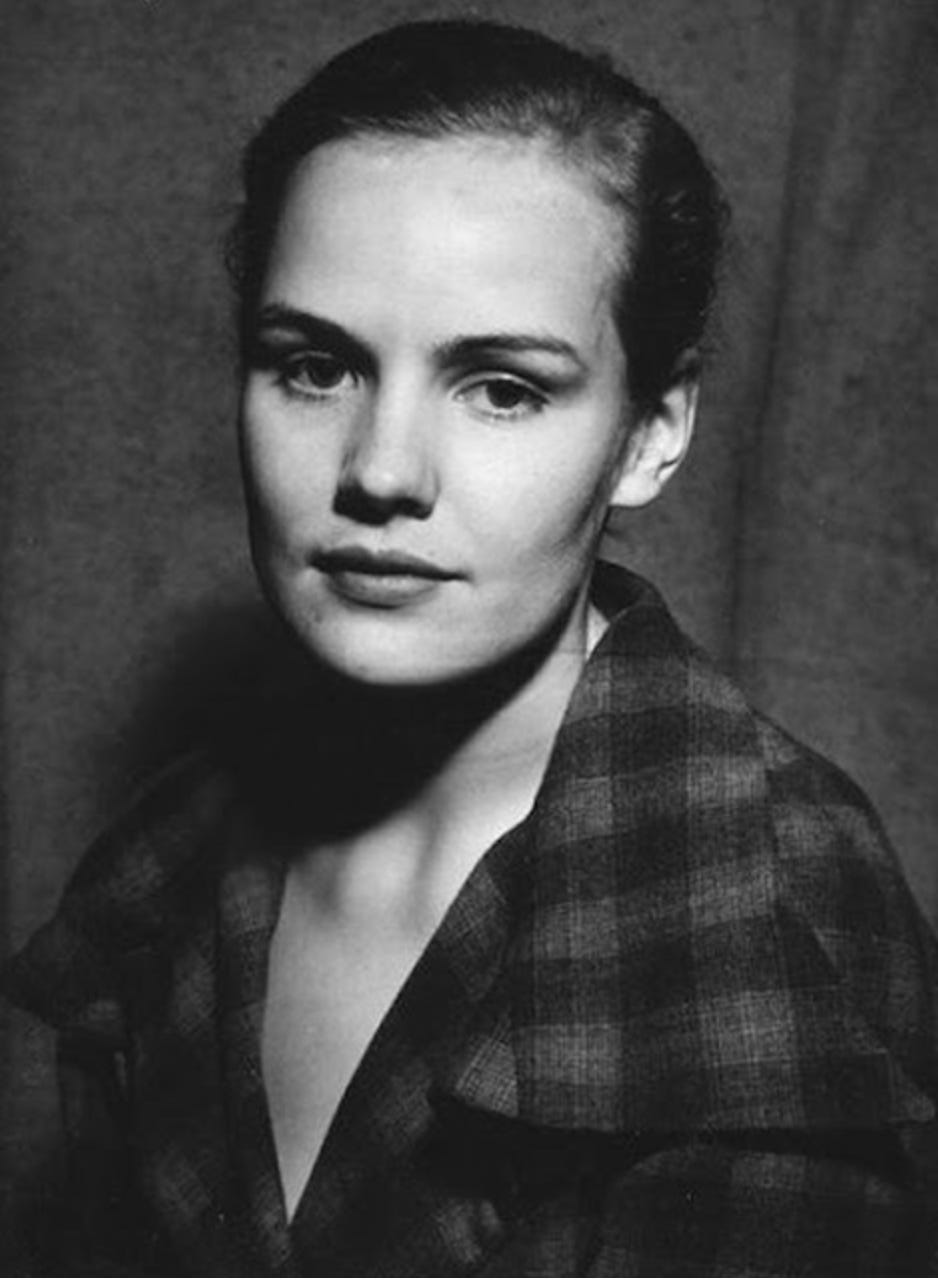

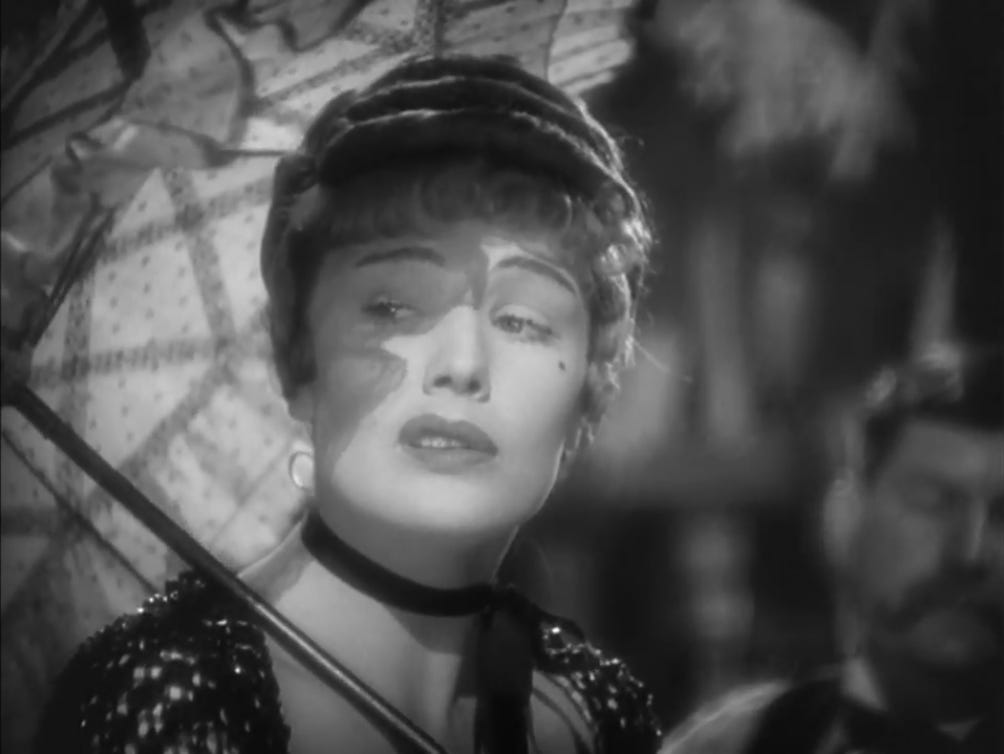
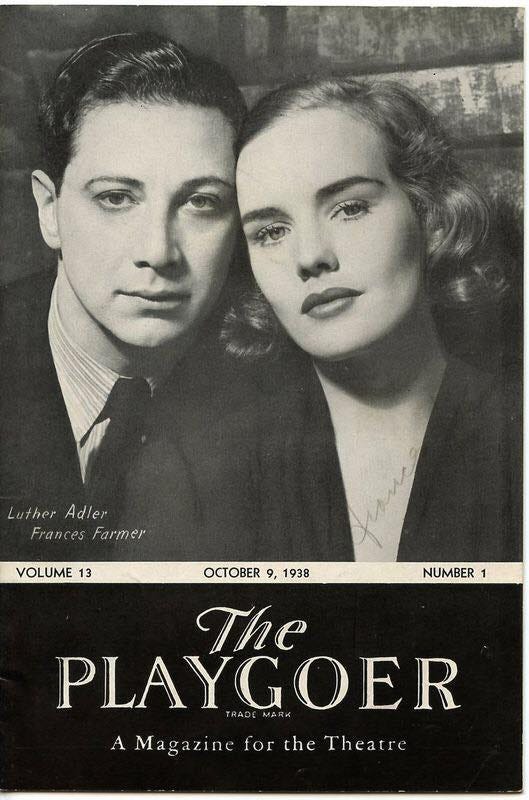


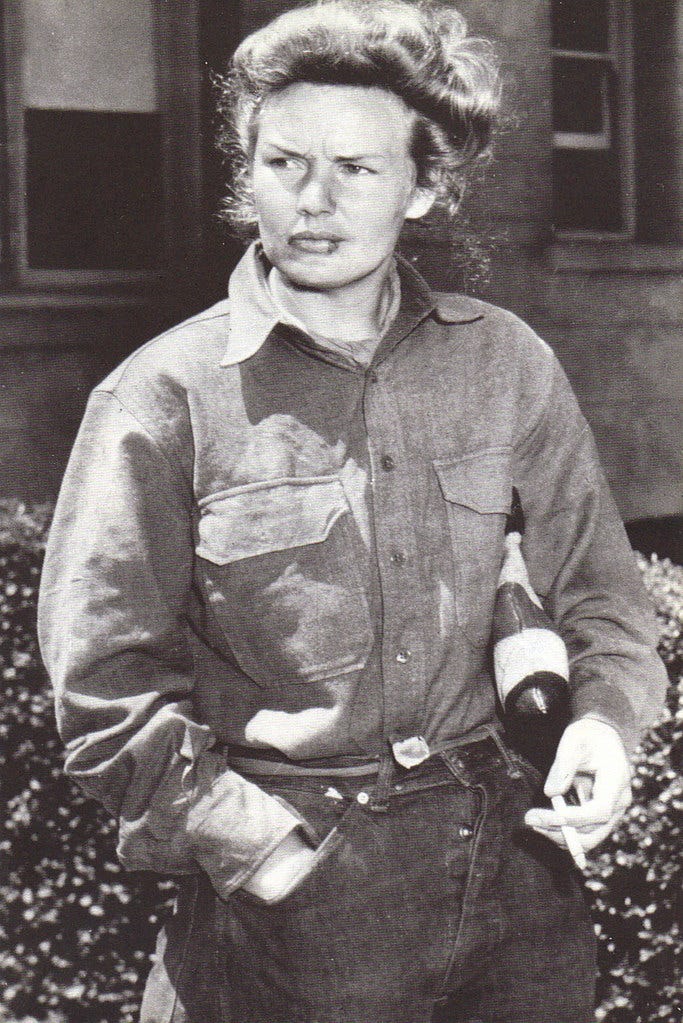


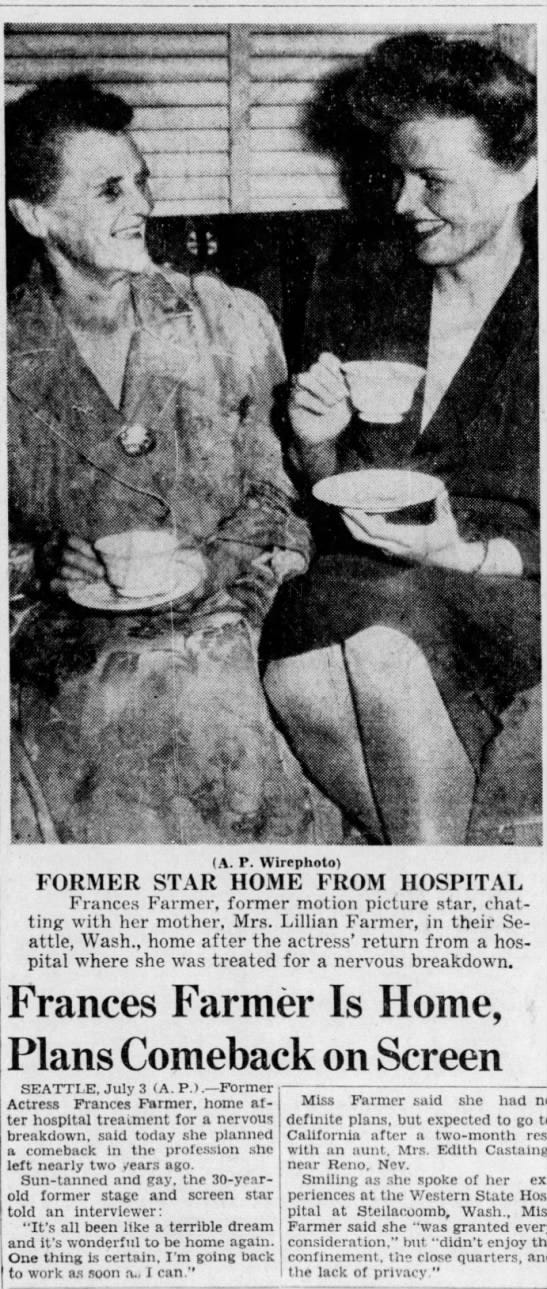


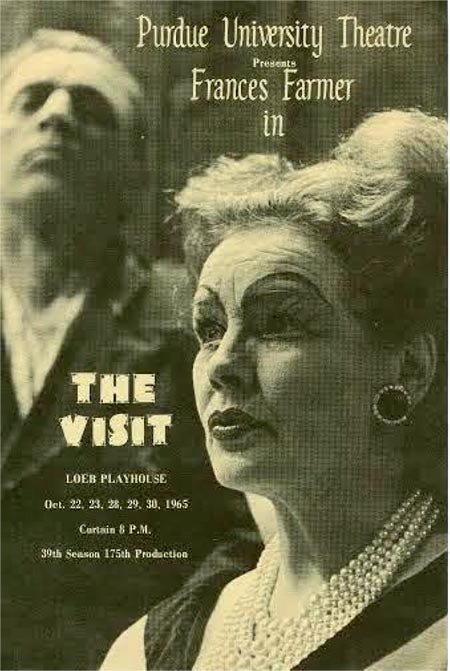

the rape scene in FRANCIS still haunts me to this day and you have such an amazing insight to her screen life Dan and exquisite perception into film in general...i just love reading your blog
Thanks so much Dan. What a life. What a promise.